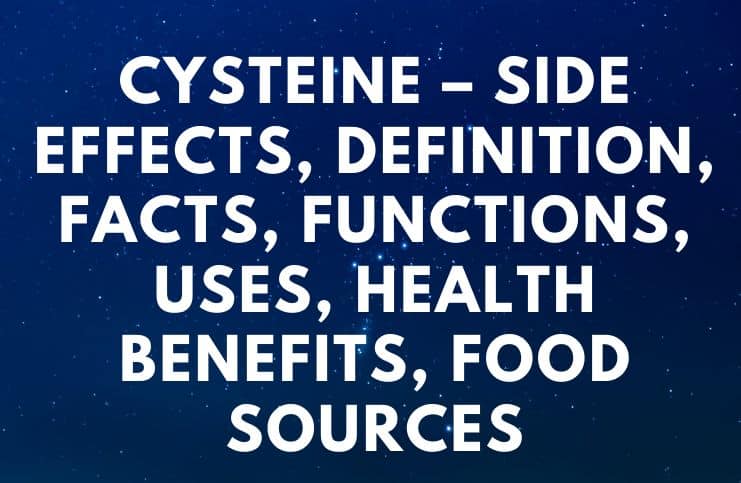Cysteine – Side Effects, Definition, Facts, Functions, Uses, Health Benefits, Food Sources:
Facts
It is an amino acid that contains sulfur. It is semi-essential, with the formula HO2CCH(NH2)CH2SH, it can be synthesized in the human body through the transformation of the amino acid methionine, which contains sulfur.
This capacity does not yet exist in infants, for whom this amino acid is an essential amino acid and important for survival.
The cysteine thiol group (is a group containing a sulfur atom bonded to a hydrogen atom) is nucleophilic and easily oxidized.
The reactivity is increased when the thiol is ionized, and these amino acid residues in proteins have pKa (acidity constant) values close to neutrality, so they are usually in their reactive thiolate form in the cell.
As a result of its high reactivity, the thiol group has numerous biological functions.
Uses and health benefits
- It is also important in the metabolism of lipids. This amino acid plays, for example, a part in building essential fatty acids and therefore facilitates the production of cell membranes and protective covers of nerve endings.
- It is a natural building block of many essential structural proteins in the connective tissue. The human body is also able to convert this multifunctional nutrient into Taurine (organic acid), which is important for the managing of electric nervous impulses, and the digestive as well as circulatory systems.
- It has been recommended as a preventative or antidote for some of the negative effects of alcohol consumption, including hangovers and liver damage. It counteracts the poisonous effects of acetaldehyde. Also, this amino acid supports the next step in metabolism, which turns acetaldehyde (an organic chemical compound) into a relatively harmless acetic acid.
- It is a basic building block of the antioxidant glutathione (GSH), the human body’s most important antioxidant. The antioxidant glutathione recharges vitamins E and C as they are used as antioxidants.
- It detoxifies heavy metals and also activates many essential functions of the immune system.
- Heart disease is the leading cause of death in the US, with approximately 610,000 people dying of heart disease every year–that’s 1 in every 4 deaths. Indirect and direct and costs of stroke and cardiovascular diseases total more than $320.1 billion. Taking supplements that contain this amino acid improves the circulatory system, heart, and health.
- Every year in the United States, over 5.4 million cases of nonmelanoma skin cancer are treated in more than 3.3 million patients. Together with vitamin C, selenium, and vitamin E, this amino acid helps skin cells form the enzymes the skin needs to defend itself against sun damage.
- Worldwide, the rise in the prevalence of allergic conditions has continued in the industrialized world for more than 50 years. According to the World Allergy Organisation, allergy prevalence of the whole population by country ranges between 10 to 40 percent. Supplements that contain this amino acid can be very useful for combating allergies that cause phlegm and snot.
Food Sources
Despite the fact it is classified as a non-essential amino acid, in rare cases, this amino acid may be essential for the elderly, infants, and individuals with certain metabolic diseases or who suffer from malabsorption syndromes.
It is found in – meat, eggs, dairy products, red peppers, garlic, onions, oats, oat bran, millet, granola, wheat germ, broccoli, Brussels sprout, sprouted lentils, red kidney beans, navy beans, mung beans, adzuki beans, almonds, pecans, hazelnuts, Brazil nuts, sesame seeds, flax seeds, chia seeds, sunflower seeds, watermelon seeds, or pumpkin seeds.
Side Effects of Cysteine
Due to its potential side effects when combined with medications, take dietary supplements only after seeing a health care specialist.
Very high doses (more than 7 grams) of this amino acid may be toxic to human cells and may even lead to death. Overconsumption may also lead to diarrhea, vomiting, heartburn, epigastric pain, dyspepsia, rectal bleeding, and nausea.
People with cystinuria, a kidney condition in which too much of this semi-essential amino acid is lost in the urine, should not take cysteine supplements.
READ THIS NEXT:
References https://pubchem.ncbi.nlm.nih.gov/compound/l-cysteine https://www.sciencedirect.com/topics/medicine-and-dentistry/cysteine
